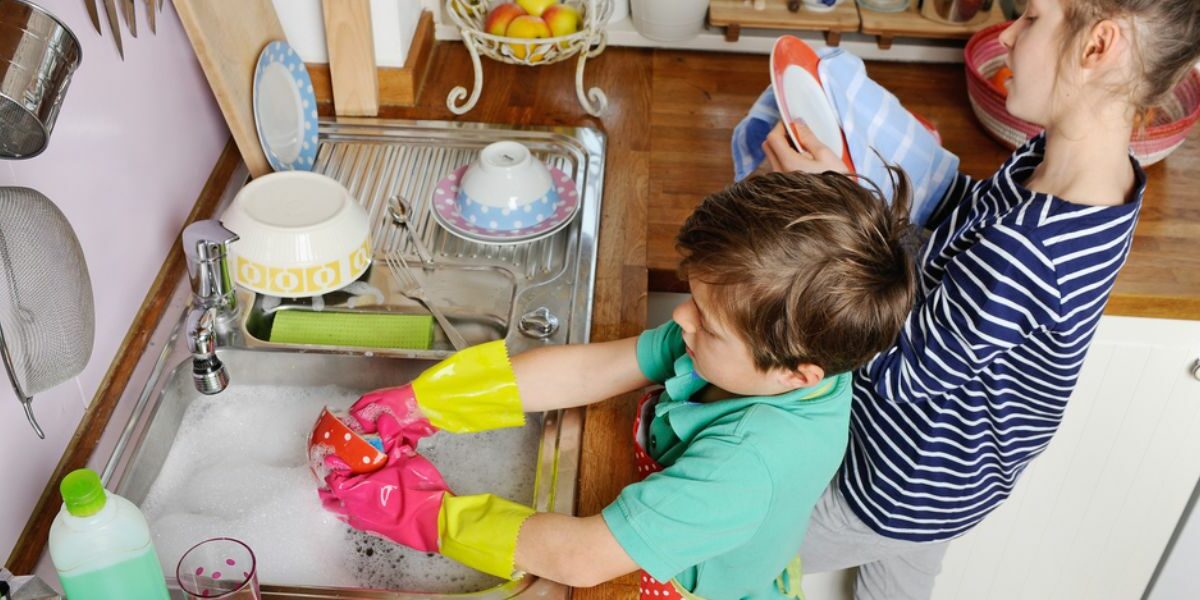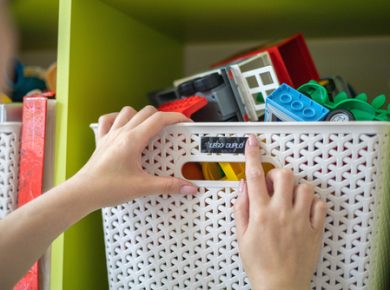Housework Tips for Your Homeschool

When you homeschool, your home becomes the headquarters not only for meals and family life, but also for homeschool lessons. Whether you’re a new homeschooler or a veteran, the atmosphere can sometimes feel overwhelming and chaotic, and it can be challenging to find time for housework.
Although hectic at times, the homeschooling home also presents many unique opportunities for growth. Homeschooling allows everyone to take more responsibility and work as a team. If you invest the time to organize and teach your children how to help with housework, you’ll end up with a healthier home management system than you had before homeschooling—one that puts less pressure on Mom and teaches children valuable life skills.
Here are some tips to help you manage housework while homeschooling.
Let go of perfectionism
In order to keep your and your children’s sanity, you may need to let go of the “perfect home” vision in your mind. Think about what your expectations are and where they might need to be adjusted. Neither you nor your kids can be cleaning constantly. Spills, wear and tear, and dirt are all going to make regular appearances. Your home will look lived in instead of pristine. When you’re decorating or making home improvements, consider sturdy furniture and flooring that can be cleaned easily and don’t show dirt as quickly.
For everyday upkeep, decide what your priorities are: a clean bathroom? Floors picked up before bedtime? No clutter on the kitchen table? Establish a few priorities that are most important and that are doable, and accept that things lower down on the list might not be done as often. That’s OK. Maybe there are one or two items that mean a lot to you but don’t make the top of the list, like deep-cleaning the shower. Consider scheduling a time to accomplish this once a month or so. You may not love how the shower looks every day of the month, but you’ll know it will be sparkling clean at regular intervals.
Kids can and should do chores
Don’t underestimate what your children can do to help. Even a toddler can pick up toys after he’s taken them out. Preschoolers are often very eager to help and try new things. Lean into that eagerness by letting your child take on projects that may seem like a stretch—especially when stakes aren’t high.
Experienced homeschool moms recommend starting to assign regular chores when a child is four years old, if not earlier. By teaching your children good habits of helping and cleaning, you’re setting yourself up for a more peaceful, productive household and also helping your children learn to be more responsible and self-sufficient.
Some families choose to use a rewards system. For example, younger children can earn stickers that add up to a treat at the end of the week, while older children can earn free time or spending money. Other families plan a special treat for everyone to enjoy after completing weekend chores, such as an afternoon at the park or ice cream. This provides extra motivation and emphasizes the satisfaction of a job well done
Here are some chores that kids can do:
- Sweep, mop, or vacuum
- Dust
- Pick up toys, school supplies, etc
- Empty trash cans
- Make snacks or simple meals
- Clean the bathroom—consider assigning one part of the bathroom to each child, such as wiping down the sink or mirror or washing the toilet or floors.
- Empty and load the dishwasher or wash and dry the dishes
- Shake rugs outside
- Keep bedroom picked up
- Sort dirty laundry
- Change the laundry from the washer to the dryer
- Fold clean laundry. You might sort the laundry into individual bins/buckets/baskets for each child, straight out of the dryer. Or simply lay out the clean laundry on an empty bed and have the kids sort and fold it.
- Older children can do a load of laundry on their own. You might put a teenager in charge of doing some or all of the family’s laundry for a week.
Use schedules and charts
Schedules, charts, and lists are extremely helpful for a few reasons. One, you ensure all bases are covered and no important tasks are forgotten. Two, children know what is expected of them and can refer to the list, chart, or schedule when in doubt.
Another benefit? By assigning chores, children begin to see these tasks as part of their daily routine, not an abnormal (and stressful) addition to their lives. If chores are assigned willy-nilly whenever you notice things that need to be done, it is often harder for children to accept them cheerfully.
When your children know what chores they have to do in a given day or week—and even have a scheduled chore time—you’ll be better able to manage household responsibilities calmly and efficiently.
Organize the chart by time of day
As you’re putting together your chore lists, consider breaking down the tasks based on when you expect them to be complete. For example, you may want your child to bring all dirty clothes to the laundry room and make his bed before breakfast. Then, after school, he should clean up toys and school supplies from the day.
Make illustrated charts for little ones
For a child who isn’t old enough to read, use the chore chart illustrations included in Building Good Character, Level B and/or CHC Lesson Plans for Preschool. (Or take pictures of him doing different chores, such as sweeping, making his bed, or emptying the trash).
Each day, paper clip the pictures to separate ribbons for each child. After he completes a chore, he should take the picture down and put it in an envelope on the wall by the ribbons. When all the pictures are gone he knows his chores are done and he can play.
Five-minute clean-ups
Also recommended: add quick, five-minute clean-ups before every meal. It’s amazing how much a family can accomplish in five minutes! By having a few five-minute breaks during the day dedicated to cleaning up, the house will stay much tidier until there is time for a thorough cleaning.
Five o’clock clean up
Some families prefer to schedule a single clean up time, often around 5 p.m. The goal is to tidy up all the toys, school books, and projects so the house will be ready for supper preparation and Dad’s arrival from work. It is a great way to transition from the day’s chaos and prepare for the evening.
Weekly chore time
Besides daily clean-ups, you will also need a more significant time set aside every week for household cleaning. Saturday morning, for example, is often a good time. Turn on some music, come up with a fun chore song, and be sure to reward your entire crew when the work is done. A trip to the park, sweet treat, or movie night could do the trick.
Make cleaning up fun
As you’re getting your children into the cleaning mode, be sure and keep the mood cheerful and upbeat—you don’t want them to dread these daily tasks. Music, treats, teamwork, or a good conversation while you work can deepen your relationship with your children and teach them to perform routine tasks with a positive attitude.
Start a race between your kids to pick up different types of toys. Dance a silly dance when the task is finished. Don’t let the workload weigh you down so much that you forget to enjoy life with your family. The housework will always wait patiently for you while you have a bit of fun.
Related Blogs
If you enjoyed this article, you might be interested in the related articles below.
Favorites
Explore CHC’s top favorites! From art to literature, science to hands-on religion, CHC has materials to enrich every Catholic homeschool.




















